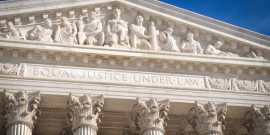Friday Roundup, January 31st
- A New Birth of the Old Freedom: David Upham in our Books feature this week reviews Gerard Magliocca’s new biography of John Bingham and his Fourteenth Amendment:
As to Magliocca’s second claim—the revolutionary character of the Amendment—the evidence that he presents is flatly contradictory. As far as Bingham was concerned, the Amendment served to renew and restore, and not overthrow, the Framers’ Constitution. While Magliocca concludes that Bingham and his colleagues “created” a “new multiracial Republic,” many Republicans, including Bingham, had always believed that the Republic was multiracial and had rejected Taney’s holding in Dred Scott in favor of the common law rule of birthright citizenship. For them, the Citizenship Clause was merely declaratory, corrective of erroneous interpretation.
As to the rest of section 1, Bingham repeatedly insisted that the Amendment was not revolutionary; it would not take away any rights from the states, but would merely provide new security for the old rights of citizens and persons.
- Scott Sumner @EconLib looks into the secret world of Keynesians:
When you read Keynesian blogs you get the impression that Keynesians think their model has been somehow confirmed by the events of the last few years. And yet figuring out what their model actually predicts can be maddeningly difficult, like nailing jello to the wall.
- Don’t miss this Fed-Soc Podcast on reforming the FISA Court.
- Charlotte Allen revisits the neighborhood the Kelo decision destroyed.
- Meanwhile, Back in America: Peggy Noonan’s Friday column hits the mark:
The State of the Union was a spectacle of delusion and self-congratulation in which a Congress nobody likes rose to cheer a president nobody really likes. . . . This year’s innovation was the Parade of Hacks. It used to be the networks only showed the president walking down the aisle after his presence was dramatically announced. Now every cabinet-level officeholder marches in, shaking hands and high-fiving with breathless congressmen. And why not? No matter how bland and banal they may look, they do have the power to destroy your life—to declare the house you just built as in violation of EPA wetland regulations, to pull your kid’s school placement, to define your medical coverage out of existence. So by all means attention must be paid and faces seen.
I watched at home and thought: They hate it. They being the people . . . But you look at the polls at how people view Washington—one, in October, had almost 9 in 10 disapproving—and you watch a kabuki-like event like this and you know the distance, the psychic, emotional and experiential distance, between Washington and America, between the people and their federal government, is not only real but, actually, carries dangers. History will make more of the distance than we do. Someday in the future we will see it most vividly when a truly bad thing happens and the people suddenly need to trust what Washington says, and will not, to everyone’s loss.

